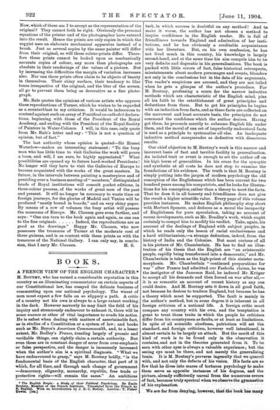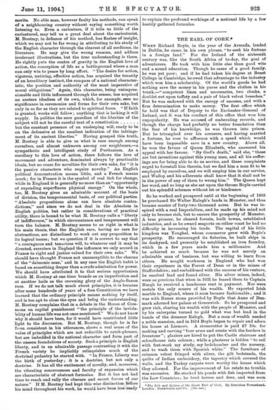BOOKS.
A FRENCH VIEW OF THE ENGLISH CHARACTER.* M. BOUTMY, who has earned a considerable reputation in this country as an illuminating commentator on certain aspects of our Constitutional law, has essayed the delicate business of commenting upon our national psychology. The wisest of men must expect a few falls on so slippery a path. A critic of a country not his own is always to a large extent working in the dark. However narrowly he may limit the field of his inquiry and strenuously endeavour to exhaust it, there will be some nuance or other of vital importance to evade his notice. He is safest when dealing with matters of ascertainable fact, as in studies of a Constitution or a system of law ; and books such as Mr. Bryce's American Commonwealth, and, to a lesser extent, Mr. Bodley's France, treating largely of prosaic and verifiable things, can rightly claim a certain authority. But even these are in constant danger of error from over-emphasis or false perspective, and the danger is immensely increased when the author's aim is a spiritual diagnosis. "What we have endeavoured to grasp," says M. Boutmy boldly, "is the fundamental basis of the English character, that part of it which, for all time, and through each change of government —democracy, oligarchy, monarchy, republic, free trade or protective rights—will remain the same." An ambitions • The English Psvis r a Study of their Political Psychology. By Emile Boutin', Member of the French Institute. Translated from the Preach by E. English. With an Introduction by .7. E. C. Bodicy. London; T. Fisher [10a.]
task, in which success is doubtful on any method ! And to make it worse, the author has not chosen a method to inspire confidence in the English reader. He is full of friendliness towards England and admiration of her insti- tutions, and he has obviously a creditable acquaintance with her literature. But, on his own confession, he has not lived much in this country, his knowledge is largely second-hand, and at the same time his aim compels him to be very definite and dogmatic in his generalisations. The book is packed with little errors of fact, false historical retrospects, misstatements about modern personages and events, blunders not only in the conclusions but in the data of his arguments. The reader's suspicions are aroused, and they are not lulled when he gets a glimpse of the author's procedure. For M. Boutmy, professing a scorn for the narrow inductive methods which are characteristic of the English mind, pins all his faith to the establishment of great principles and deductions from them. But to get his principles he begins with an induction from facts, and as these facts are collected on the narrowest and least accurate basis, the principles do not command the confidence which the author desires. Having got them, he proceeds merrily to subsume English life under them, and the moral of one set of imperfectly understood facts is used as a principle to systematise all else. An inadequate inductive method masquerades as deductive with disastrous results.
Our chief objection to M. Boutmy's work is this narrow and incorrect basis of fact and terrible facility in generalisation. An isolated trait or event is enough to set the author off on. his high horse of generalities. In his craze for the synoptic and synthetic at all costs he does not stop to examine the foundations of his evidence. The truth is that M. Boutmy is simply putting into the jargon of modern psychology the old conception of the Englishman which has been current for two hundred years among his compatriots, and he looks for illustra- tions for his conceptionrather than a theory to meet the facts. That he does it in all honesty and friendliness does not give the result a higher scientific value. Every page of this volume provides instances. He makes English philosophy stop short with Herbert Spencer, and deduces as a moral the incapacity of Englishmen for pure speculation, taking no account of recent developments, such as Mr. Bradley's work, which ought certainly to compel him to modify his verdict. Take, again, his account of the dealings of England with subject peoples, in which he reads only the lesson of racial exclusiveness and a hard utilitaiianism,—a strange deduction, indeed, from the history of India and the Colonies. But most curious of all is his picture of Mr. Chamberlain. He has to find an illus- tration of his thesis that the English are "an aristocratic people, rapidly being transformed into a democratic," and Mr. Chamberlain is taken as the high-priest of this sinister meta- morphosis. Mr. Chamberlain "continued preparations for war" after France had admitted our Fashoda claims, he was the instigator of the Jameson Raid, he induced Mr. Krfiger to accept all his demands and then forced on war after all,— it is as romantic an account of recent history as any one could desire. And M. Boutmy sets it down in all good faith, not because he desires to traduce England, but because he has a theory which must be supported. The fault is mainly in the author's method, but in some degree it is inherent in all foreign criticism of a national life. A foreign critic must. compare any country with his own, and the temptation is great to treat those traits in which the people he criticises differ from his countrymen as faults, or at least as limitations. In spite of all scientific aloofness, patriotism will set the standard, and foreign criticism, however well intentioned, is almost certain to be largely an attack. But the merit of this kind of work is to be found only in the observation it contains, and not in the theories generated from it. To be seen with other eyes is always a valuable experience ; but the seeing eye must be there, and not merely the generalising brain. It is M. Boutmy's perverse ingenuity that we quarrel with, and not only the defects of his vision. His facts are so few that he dives into mazes of tortuous psychology to make them serve as apposite instances of his dogmas, and the picture, already sufficiently unreal from the numerous errors of fact, becomes truly spectral when we observe the gymnastics of his explanation.
merits. No able man, however faulty his methods, can speak of a neighbouring country without saying something worth listening to. Even a caricature, if it tells us little of the caricatured, may tell us a great deal about the caricaturist. M. Boutmy, in defiance of his method, has flashes of insight, which we may not be far wrong in attributing to his study of the English character through the clearest of all mediums, its literature. He may give the wrong reasons, and adduce irrelevant illustrations, but the true understanding is there. He rightly puts the centre of gravity in the English love of action, the conception of life as a battleground where a man can only win to peace by long effort. "The desire for action, vigorous, untiring, effective action, has acquired the tenacity of an hereditary instinct, the compass of a national character- istic, the position and authority of the most imperative of moral obligations." Again, this character, being unimpres- sionable and little influenced through the senses, has acquired an austere idealism of its own, which, for example, sees no significance in ceremonies and forms for their own sake, but only in so far as they are related to spiritual force. "If faith is granted, works will follow ; anything that is lacking it will supply. In politics the sure guardian of the liberties of the
subject will not be the careful text of a constitution but the constant presence of an unsleeping will, ready to be on the defensive at the smallest indication of the infringe- ment of its ancient liberties." Having grasped this truth, M. Boutmy is able to give us what is rare enough among ourselves, and almost unknown among our neighbours,—a sympathetic and intelligent study of Puritanism. As a oorollary to this love of action, there follows the love of movement and adventure, dominated always by practicable ideals, but no craze for novelties for their own sake, for "it is the passive characters who require novelty." An English political demonstration means little, and a French means much ; for in France it is the symbol of real itch for change, while in England it is generally no more than an" opportunity of expending superfluous physical energy." On the whole, too, M. Boutmy gives an admirable account of the basis of division, the temperamental basis, of our political parties. "Absolute propositions alone can have absolute contra- dictions," and since we do not deal in the Absolute in English politics, but rather in considerations of practical utility, there is bound to be what M. Boutmy calls a "liberty of indifference," in which circumstance and temperament will turn the balance. M. Boutmy seems to us right in what is his main thesis, that the English race, having no care for abstractions, are disinclined to work out any proposition to its logical issues; but we question if it is correct to say that ." a courageous and tenacious will, to whatever end it may be directed, exercises in England the influence we only accord in France to right and justice valued for their own sake." We should have thought France not unsusceptible to the charms of the "daimonic man," and in any case the English habit is based on something deeper than a crude admiration for power. We should have attributed it to that serious opportunism which M. Boutmy at one time brands as an imperfection and at another hails as the crowning glory of the Anglo-Saxon race. If we do not talk much about principles, it is because after some hundreds of years of a free Constitution we have learned that the ordinary principle means nothing by itself, and is too apt to close the eyes and befog the understanding. M. Boutmy complains that in a debate in the House of Com- mons on capital punishment "the principle of the inviola- bility of human life was not once mentioned." We do not know why it should have been, for it would have contributed little light to the discussion. But M. Boutmy, though he is far from consistent in his utterances, shows a real sense of the value of principles which are not reducible to catch-phrases,
• but are imbedded in the national character and form part of the unseen foundations of society. Such a principle is English liberty, and in an admirable passage contrasting it with the French variety he implicitly relinquishes much of the ■ loctrinal pedantry he started with. "In France, Liberty was the birth of yesterday ; it is a doctrine, but not only a 'doctrine. It has all the excitement of novelty, and, moreover, the vibrating sonorousness and faculty of expansion which are characteristic of abstract formulas. But it has not bad time to reach and rally the obscure and secret forces of our nature." If M. Boutmy had kept this wise distinction before his mind throughout his work, he would have been less ready THE EARL OF CORK.*











































 Previous page
Previous page